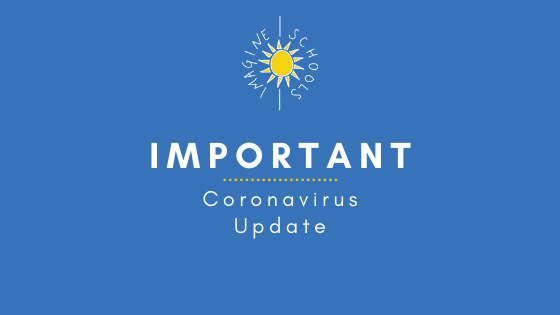
For information on school closures and changes to activities, please contact your individual campus leadership. Additionally, be sure to check your preferred form of communication from your Imagine campus (email, social media, etc.) for ongoing updates.
Given the recent, elevated attention to COVID-19 (Coronavirus), we wanted to remind you of some important health tips that you can practice throughout the day to help keep your family and community healthy.
- Wash your hands often with soap and water for at least 20 seconds. (This is the length of time it takes to sing the ‘Happy Birthday’ song twice.) This is especially important upon entering the home; after using the bathroom; before eating; and after blowing your nose, coughing, or sneezing. If soap and water is not available, use an alcohol-based hand sanitizer that contains at least 60% alcohol.
- Avoid touching your eyes, nose, and mouth with unwashed hands.
- Avoid close contact with people who are sick.
- Stay home when you are sick, except to get medical care.
- Cover your cough or sneeze with a tissue, then throw the tissue in the trash. If you do not have a tissue, cough or sneeze into the inside of your elbow, not your hands.
- Avoid sharing food, drinks, and utensils with others.
- Continue to eat healthy foods, exercise, and get adequate sleep.
- Clean and disinfect frequently touched objects and surfaces using a regular household cleaning spray or wipe.
- Consider getting a flu shot—it’s not too late to be protected against influenza.
- While Imagine Schools cannot set restrictions on personal travel, we urge families to avoid non-essential travel whenever possible.
On Campus
Imagine staff members are reinforcing the above steps with scholars and each other, and our maintenance teams continue to work daily to thoroughly clean facilities and disinfect frequently touched surfaces.
If a student or staff member shows respiratory symptoms, each campus will continue to follow its current practice for handling respiratory illness. Please remember, if your child has a fever, he or she should remain home until they are fever-free without medication for 24 hours.
Additionally, we are continually monitoring the situation and will refer to state/local officials, the CDC and the Department of Health for future updates. We urge you to also only trust these or other credible sources.
As the details around COVID-19 are rapidly changing, please refer to the CDC and the local Department of Health websites for the most up-to-date information:
Centers for Disease Control and Prevention
State and Territorial Health Department Websites
Travel Warnings
The U.S. Department of State and the Centers for Disease Control and Prevention (CDC) have issued travel warnings to and from countries with widespread, ongoing community spread of COVID-19 (Coronavirus). Level 3 Travel Health Notices have been issued for China, Iran, South Korea, and Europe. For a full list of the European countries included in this notice, please visit: https://wwwnc.cdc.gov/travel/notices/warning/coronavirus-europe.
If any member of your household traveled to one of these countries recently, including over spring break, we request that you notify school administrators immediately and follow the CDC recommended after-travel precautions:
- Self-isolate for 14 days and practice social distancing. This means staying home and avoiding contact with others. Do not go to work or school for this 14-day period.
- Take your temperature with a thermometer two times a day and monitor for fever. Also watch for cough or trouble breathing.
- Do not take public transportation, taxis, or ride-shares during the time you are practicing social distancing.
- Avoid crowded places (such as shopping centers and movie theaters) and limit your activities in public.
- Keep your distance from others (about 6 feet).
For additional health precautions, please visit: https://www.cdc.gov/coronavirus/2019-ncov/travelers/after-travel-precautions.html.
We rely heavily on parents and guardians as the first line of care and awareness for potentially ill students. Students who do not feel well should stay home. This practice aligns with the CDC recommendations to use isolation and other routine precautionary measures as an important part of everyday preventive actions to help minimize the spread of respiratory illnesses, including COVID-19.
Looking Ahead
As stated, we will continue to monitor this evolving situation closely, and will update families as necessary, both at the campus level and the national level. In the meantime, it is important not to panic. Please be assured that the health and safety of our students and staff is our highest priority, and we will continue to do all that we can to maintain continuity of operations while minimizing student and staff exposure.
We must take care of ourselves and each other during times of uncertainty.
Stay healthy, Imagine families!
